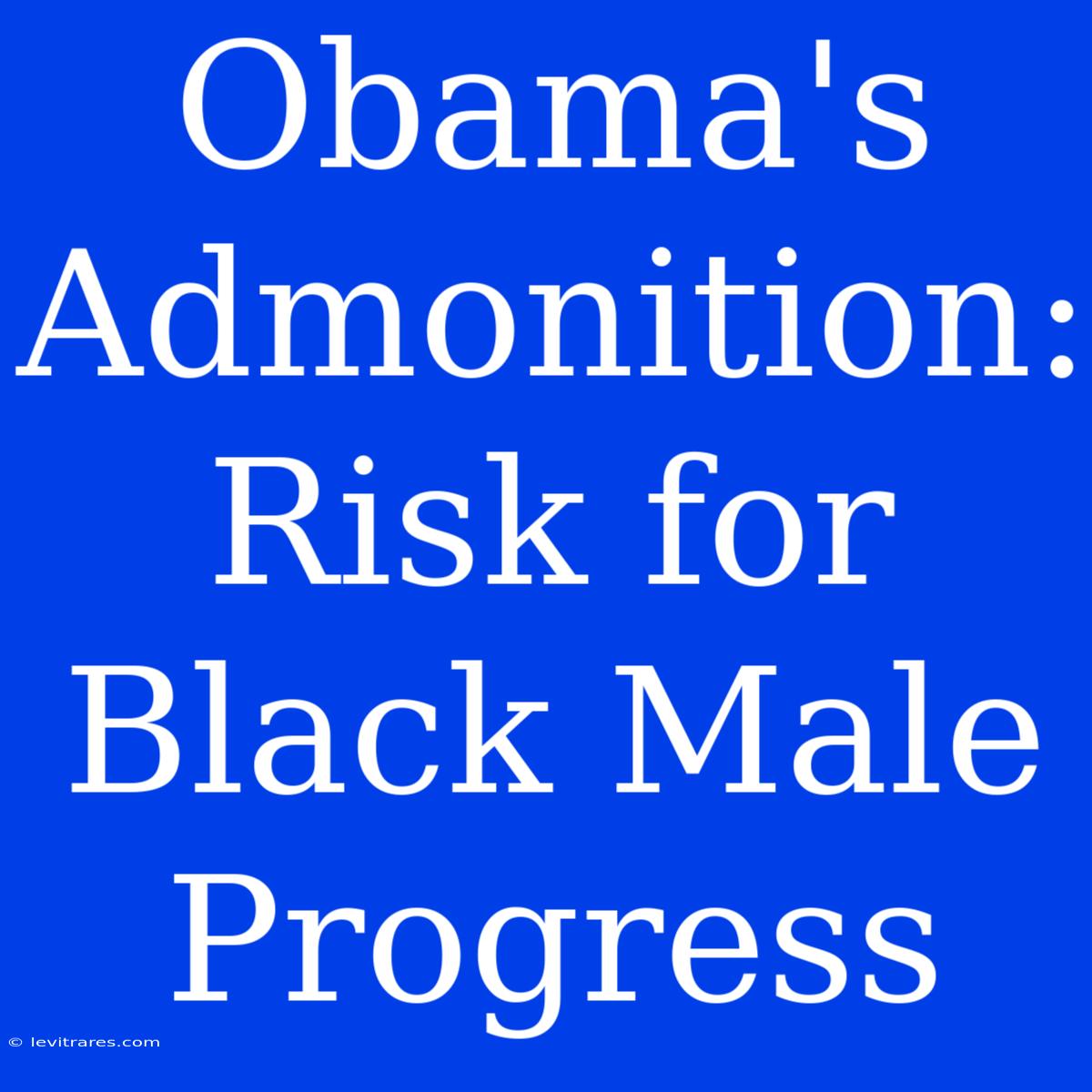Obama's Admonition: Risk for Black Male Progress
Can societal risks hinder the progress of Black men in America? Barack Obama's poignant warning about the risks associated with Black male advancement should not be overlooked.
Editor Note: This exploration delves into the critical message former President Barack Obama delivered about the ongoing challenges facing Black men in the United States. It is crucial to understand this topic because it sheds light on systemic issues and historical inequalities that continue to impact Black communities.
This analysis examines the risks Obama highlighted and explores how they impede progress for Black men. It will explore themes of racial bias, economic disparities, criminal justice, and educational inequities.
Analysis: This article draws on Obama's speech and analyzes expert commentary, data, and research to provide a nuanced understanding of the challenges facing Black men. We aim to unpack the root causes of these risks and discuss potential solutions.
Key Considerations for Black Male Progress:
| Key Consideration | Description |
|---|---|
| Systemic Racism | Deeply ingrained societal biases that perpetuate inequality and disadvantage Black men in various aspects of life. |
| Economic Disparities | Wide wealth gaps, higher poverty rates, and limited access to opportunities that hinder economic advancement. |
| Criminal Justice System | Disproportionate rates of incarceration, police brutality, and biased sentencing practices, leading to mass incarceration and strained relationships with law enforcement. |
| Educational Inequities | Inadequate access to quality education, underrepresentation in STEM fields, and disparities in school funding, impacting future prospects. |
| Health Disparities | Higher rates of chronic illnesses, limited access to quality healthcare, and health disparities leading to shorter life expectancies. |
Systemic Racism
Systemic racism permeates various aspects of society, creating a system of disadvantage that impacts Black men's lives. This can manifest through implicit biases, discriminatory hiring practices, and limited access to quality housing, education, and healthcare.
Facets:
- Implicit Bias: Unconscious biases that can lead to unfair treatment of Black men, even when individuals believe they are being fair.
- Discrimination: Open and intentional prejudice against Black men, hindering opportunities for advancement and leading to unequal treatment in the workplace, housing, and education.
- Historical Legacy: The lingering effects of slavery and Jim Crow laws continue to shape the present, creating challenges for Black men in areas like wealth accumulation and political representation.
Economic Disparities
The economic gap between Black and white Americans is a persistent issue, and Black men face significant challenges in achieving economic security. They often experience higher unemployment rates, lower wages, and limited access to homeownership and wealth-building opportunities.
Facets:
- Wage Gap: Black men earn significantly less than white men, even when controlling for factors like education and experience.
- Job Discrimination: Black men face discrimination in hiring practices, promotions, and access to leadership positions, limiting their economic potential.
- Wealth Gap: Black men have significantly less wealth than white men, due to factors like historical discrimination, limited access to financial resources, and barriers to generational wealth transfer.
Criminal Justice System
Black men are disproportionately incarcerated, policed, and subjected to harsher sentencing practices. The criminal justice system perpetuates a cycle of disadvantage, undermining their economic and social well-being.
Facets:
- Mass Incarceration: The disproportionate incarceration of Black men, often for non-violent offenses, contributes to economic hardship, family disruption, and diminished life opportunities.
- Police Brutality: Black men are more likely to be targeted by police violence, and incidents of excessive force and racial profiling continue to spark outrage and distrust.
- Racial Bias in Sentencing: Black men receive harsher sentences for the same crimes committed by white individuals, highlighting racial bias in the justice system.
Educational Inequities
Access to quality education is crucial for Black men's upward mobility, yet they face systemic barriers that hinder their educational achievements. From underfunded schools in predominantly Black communities to limited access to higher education, inequities persist.
Facets:
- School Funding Disparities: Schools in predominantly Black communities often receive less funding than schools in predominantly white communities, leading to disparities in resources, teacher quality, and educational opportunities.
- Racial Tracking: Black students are more likely to be placed in lower-level classes, limiting their access to challenging coursework and hindering their academic progress.
- College Access and Affordability: Black men face greater obstacles in accessing and affording higher education due to factors like limited access to financial aid, cultural biases, and systemic barriers.
Health Disparities
Black men experience higher rates of chronic diseases, shorter life expectancies, and limited access to quality healthcare. These health disparities are linked to social determinants of health, including poverty, stress, and environmental factors.
Facets:
- Chronic Diseases: Black men are more likely to suffer from chronic illnesses such as heart disease, diabetes, and cancer, due to a combination of genetic factors, socioeconomic disadvantages, and limited access to healthcare.
- Life Expectancy: Black men have a significantly lower life expectancy than their white counterparts, attributed to factors like higher rates of violent crime, exposure to environmental hazards, and limited access to preventive healthcare.
- Healthcare Access and Quality: Black men face greater challenges in accessing quality healthcare due to factors like lack of insurance, limited availability of providers in their communities, and implicit bias among healthcare professionals.
Conclusion:
Barack Obama's admonishment serves as a stark reminder of the continued challenges facing Black men in America. The interconnected issues of systemic racism, economic disparities, criminal justice inequities, educational inequities, and health disparities create a web of disadvantage that limits their progress and opportunities. Addressing these issues requires a multifaceted approach, encompassing systemic reform, policy changes, community engagement, and a commitment to dismantling the structures of inequality that have long plagued Black communities.

